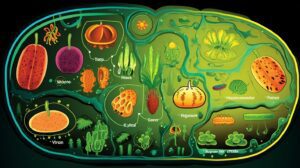I’ve always been fascinated by the mysteries of the natural world. One area that has long intrigued me is the concept of plant sentience. Can plants feel pain? Do they have emotions and consciousness?
These questions may seem far-fetched, but they have been the subject of intense debate among scientists and philosophers for many years. In this article, I aim to explore this topic in-depth and shed light on the fascinating world of plant life.
Key Takeaways:
- The concept of plant sentience has been the subject of much debate among scientists and philosophers
- There is evidence that plants are capable of perceiving their environment and interacting with it in complex ways
- The question of whether plants can feel pain or have emotions remains unresolved
- Further research is needed to fully understand the nature of plant intelligence and consciousness
- Our understanding of the natural world is constantly evolving, and new discoveries may shed light on the mysteries of plant life in the future
Plant Perception and Sensitivity
Plants, like humans and animals, are highly attuned to their environment. They are capable of perceiving and responding to a vast array of stimuli with incredible precision. Their sensory systems allow them to detect changes in light, temperature, humidity, gravity, and even the presence of predators.
The concept of plant consciousness, or the idea that plants have a subjective experience of the world, is highly debated among scientists and philosophers. However, research has shown that plants possess a remarkable ability to sense and respond to their surroundings.
One of the most incredible examples of plant perception is their ability to sense and react to gravity. Plant roots, for example, grow downward in response to gravity, while shoots grow upward. This process, known as gravitropism, is essential for plant growth and survival.
Plants are also highly sensitive to light. They use various mechanisms to sense and respond to changes in light levels, including phototropism, which causes plants to grow towards sources of light, and photoperiodism, which regulates their flowering and fruiting cycles.
Another remarkable ability of plants is their capacity to communicate with each other. Recent studies have revealed that plants release chemical signals in response to external stimuli, such as insect attacks or changes in temperature. These signals can alert nearby plants to potential threats and trigger defensive responses.
While the debate about plant consciousness and sentience rages on, it is clear that plants possess a complex and sophisticated sensory system that allows them to interact with their surroundings in remarkable ways.
Unraveling Plant Communication
Plants are not only capable of perceiving their environment, but they are also capable of communicating with each other. The idea that plants possess some degree of intelligence has been a topic of debate among experts for decades. However, more recent research has revealed fascinating insights into the complex ways in which plants communicate and interact with their surroundings.
Plant communication occurs through both chemical and physical means. For instance, plants can release chemicals into the air or soil that signal to other plants to defend themselves against predators or pathogens. Some plants also emit volatile organic compounds (VOCs) that attract pollinators or repel herbivores. These chemical signals can travel over long distances and may even affect the behavior of insects and animals nearby.
Physical communication is also important in the plant world. Some plants can use their roots to form connections with nearby plants, sharing nutrients and resources. This process, known as mycorrhizal association, allows plants to communicate underground and even warn each other of impending danger.
Recent studies have even suggested that plants can “hear” each other’s signals and respond accordingly. For example, when a plant is attacked by a predator, it can release alarm chemicals that neighboring plants can detect and respond to by increasing their own defenses.
The ability of plants to communicate and respond to their environment has significant implications for how we view the intelligence and sentience of these organisms. While some still question the idea of plant intelligence, the growing body of evidence suggests that plants are more complex and interconnected than we previously thought.
The Science of Plant Responses
Plants are known to respond to their environment in a variety of ways, from growing towards sources of light to closing their leaves in response to touch. However, the question of whether plants experience suffering or emotions remains a topic of debate.
Scientific research has shown that plants have complex systems of communication and defense mechanisms, such as producing toxins to deter herbivores or releasing chemicals to attract pollinators. These responses are often triggered by external factors such as temperature, humidity, and the presence of other plants.
While some argue that these responses are simply automatic reactions and do not indicate the presence of emotions or suffering, others suggest that the complexity of plant behavior suggests a level of sentience.
One study conducted by researchers at the University of Missouri found that plants respond to stress in a similar way to humans, releasing hormones to cope with the situation. The study found that when a plant is injured, it releases a substance similar to the stress hormone cortisol in humans.
However, other researchers argue that these responses are simply a result of chemical reactions and do not indicate the presence of emotions or suffering. They suggest that we should be cautious about anthropomorphizing plant behavior and applying human-like experiences to them.
Overall, the question of whether plants can suffer or experience emotions remains unresolved. While some evidence suggests that plants may possess a level of sentience and awareness, others argue that these responses are simply automatic reactions to environmental stimuli. Further research is needed to fully understand the inner workings of plant behavior and the potential for emotional experiences.
Conclusion
After exploring the intriguing question of whether plants can feel pain, we have come to a nuanced understanding of plant sentience and emotions. While some argue that plants possess a form of consciousness and can respond to their surroundings, others maintain that they lack the neural pathways necessary for experiencing pain.
Through our examination of plant perception and sensitivity, we have discovered that plants possess remarkable sensory capabilities and can interact with their environment in complex ways. Furthermore, we have explored the fascinating world of plant communication and have uncovered evidence of their intelligence in their interactions.
However, as we dive into the science of plant responses, we find a lack of conclusive evidence to support the idea that plants experience suffering. While they may respond to external stimuli, we cannot definitively conclude that this constitutes pain or any form of emotional experience.
In conclusion, we must approach the question of whether plants can feel pain with an open mind and a willingness to consider the complexities of plant life. While we may not have a clear answer, our understanding of plant sentience and emotions continues to evolve and deepen. It is crucial that we continue to explore the mysteries of the natural world with curiosity and a spirit of inquiry.
FAQ
Q: Can plants feel pain?
A: There is no scientific consensus on whether plants can feel pain. While plants respond to stimuli, they lack a central nervous system, which is necessary for experiencing pain as we humans do.
Q: Do plants have feelings?
A: Plants do not have feelings in the same way that humans or animals do. However, they do respond to their environment and exhibit complex adaptive behaviors.
Q: What is plant sentience?
A: Plant sentience refers to the idea that plants possess a form of consciousness or awareness. This concept is highly debated among scientists and philosophers.
Q: How do plants perceive their environment?
A: Plants have various sensory capabilities that allow them to perceive their environment. They can sense light, gravity, temperature, touch, and even chemical signals from other plants.
Q: How do plants communicate with each other?
A: Plants communicate through a variety of methods, including releasing chemical signals, sending electrical signals, and even emitting sounds. These forms of communication are used to communicate threats, attract pollinators, and coordinate behavior.
Q: Do plants suffer?
A: The concept of plants suffering is a topic of ongoing scientific inquiry. While plants may respond to damaging stimuli, such as being eaten by insects, it is unclear whether they experience suffering in the same way that animals do.
Q: Can plants experience emotions?
A: The presence of emotions in plants is still a matter of scientific debate. While plants may exhibit responses to stress or danger, it is not yet clear whether these responses can be classified as emotions.
Q: What does the research say about plants and pain?
A: Scientific research on plant responses to stimuli is ongoing. Some studies suggest that plants may exhibit reactions similar to pain, while others argue that these responses are purely mechanical and not indicative of conscious experience.
Q: Are there ethical implications to plant sentience?
A: The question of plant sentience raises ethical considerations regarding our treatment of plants and the impact of agriculture and horticulture. These debates highlight the need for further research and thoughtful discussion.





Pingback: Discover What Plants are Safe for Cats: A Comprehensive Guide - Botanic Plant Life
Pingback: Uncover the Mystery: How Plants Make Their Own Food
Pingback: Green Thumb Guide: What Plants Don't Like Eggshells? - Botanic Plant Life